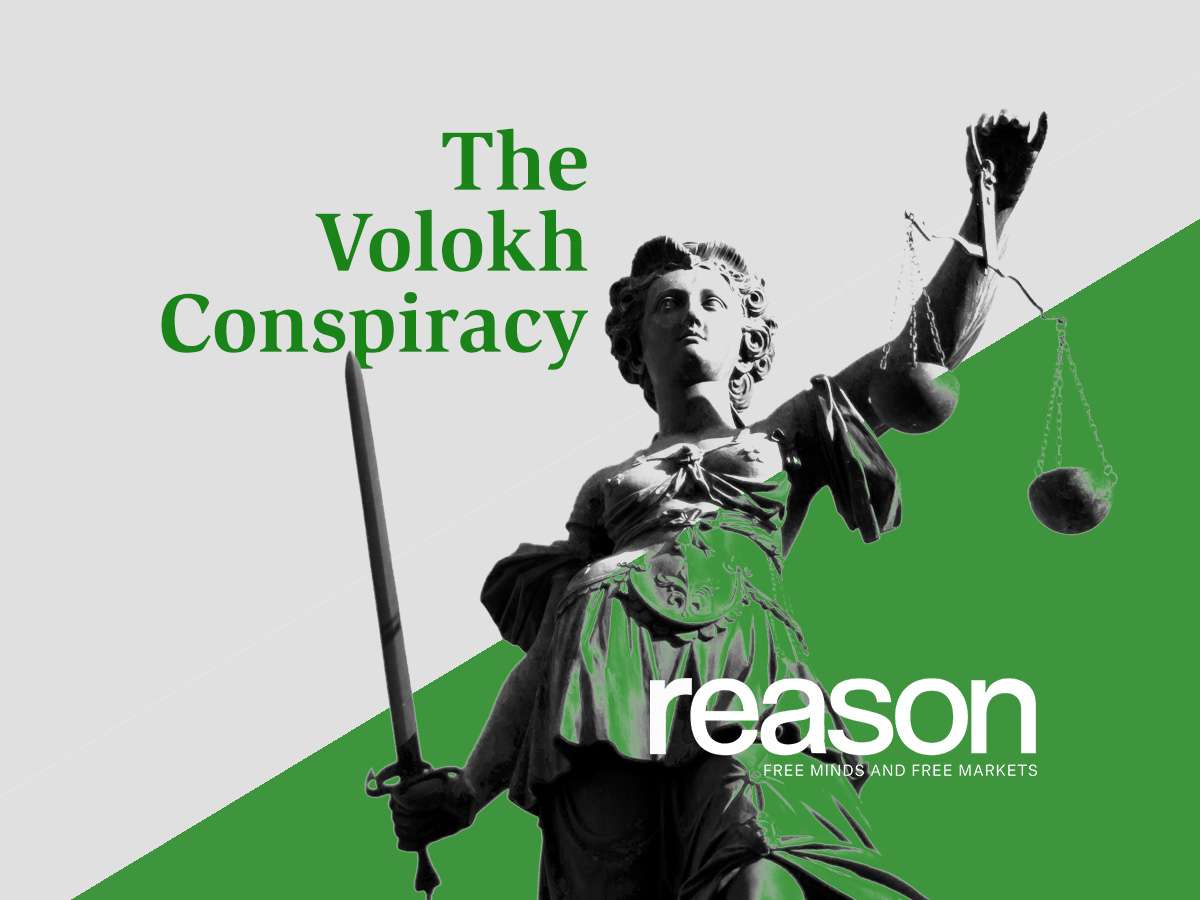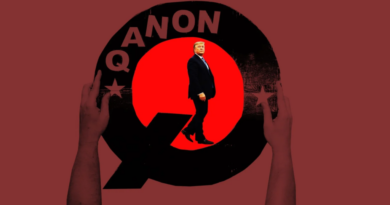When Should Security Clearance Be Denied Based on Interest in QAnon and Three Percenters?

From a decision released Oct. 24, but just posted on Westlaw, ISCR Case No. 22-00849 (Dep’t of Defense Office of Hearings & Appeals) (Administrative Judge Edward W. Loughran), concluding that the applicant, who worked for a DoD contractor, should regain his security clearance; an excerpt, though you can read the full decision for more on the Three-Percenters, QAnon, and the general legal rules applicable in this case:
Findings of Fact
… On January 13, 2021, a U.S. servicemember reported that a vehicle on the military installation was “displaying Three Percenter and QAnon stickers on its back window. Both of these organizations/beliefs have been linked to racially motivated violent extremism and anti-government actions.” He reported that he first noticed the “III” sticker on July 31, 2020, and the QAnon sticker on January 12, 2021. He stated that he became aware of the III symbol because it was reported that an NFL player had the symbol as a tattoo.
The military criminal investigation division did a criminal and insider-threat analysis and determined that Applicant was not suspected of committing a criminal offense or being an insider threat. The military criminal investigation division did not open an investigation, with the following rationale in an email dated January 15, 2021:
- Social media was identified with no derogatory information noted.
- The FBI has not designated the 3%ers or QAnon as a terrorist organization. Neither of them are organized groups.
- The 3%er sticker alone is not an indicator of militia affiliation (see attached [FBI Joint Information Bulletin identified in above Evidence section] and below for more details.
- While an internet search for three percenters (III%) and QAnon will yield several sites declaring them anti-government, militia linked, or conspiracy theorists; as with any group there are those who take matters to the extreme and those who are more conservative in their voice. Displaying a sticker in support of either group does not make an individual a threat.
- At this time, [Applicant] is not suspected of committing a criminal offense or insider threat.
An administrative investigation was ordered and completed by a U.S. military field grade officer. The investigation disclosed that the vehicle belonged to Applicant. The Three Percenter sticker has III inside a circle of stars. The QAnon sticker is a stylized Q with a skull inside. Applicant bought the III sticker on eBay for $20 and placed it on his vehicle in about June 2020. He bought the QAnon sticker on eBay for $10 and placed it on his vehicle in about January 2021. He also bought a rubber bracelet with a red Q.
During the investigation, Applicant stated that he placed the III sticker on his vehicle because he liked the design and to “tell that I defend the Constitution. That I am a patriot. I want to show loyalty as a patriotic American.” He stated that his understanding of the Three Percenters was that “”[i]t’s like Paul Revere, protecting the second amendment and the Constitution. Nothing to do with supremacy or extremism.”
Applicant stated that he placed the QAnon sticker on his vehicle “to raise awareness. Spawn curious[ity] and let people research for themselves.” He stated that his understanding of QAnon was that it “is a group that conducts independent research. It’s not an ideology nor does it promote violence or any type of derogatory actions. [T]here is no ill har[m] at all. It is suspected of being very close to [the] Trump administration.”
The investigator interviewed a number of Applicant’s work colleagues. He was described as “glad to be at work”; “low-key, calm, friendly, easy going guy”; “respectful and competent in his duties”; “very quiet, tends to keep things to himself”; and an “introvert.” Most of his colleagues stated that they had not seen Applicant display images of either QAnon or Three Percenters, but most of his colleagues were unfamiliar with QAnon or Three Percenters before the investigation.
Applicant’s supervisor at the time, a retired lieutenant colonel, provided a statement for the investigation. He had never heard Applicant discuss Three Percenters or QAnon, and he never heard Applicant advocate any activities designed to overthrow the U.S. Government by force. He stated that “[e]verybody in the office discussed the riots on Jan. 6. We were all horrified by the incident and everyone in the office disagreed with what occurred, including [[Applicant].” The supervisor was unfamiliar with Three Percenters before Applicant’s stickers became an issue. He then looked them up online. What he found indicated that the Three Percenters supported the Constitution by non-violent means. He also looked up QAnon, and he felt it was developed as a joke, and that “[w]ho else would come up with a story line that the world is controlled by a small cabal of children eating cannibals? A good video game story, but, laughable. I don’t think anyone takes it seriously, but they enjoy following the antics of the few idiots who do.”
One employee reported to the investigator that he and Applicant were traveling by car on a work trip when he noticed Applicant wearing a rubber bracelet with a red letter Q. The employee asked him about the bracelet. Applicant stated it was an online social media group that he followed. The employee reported that Applicant “described Q as what [he] would consider conspiracy theories about shadow government and pedophiles.”
The investigator reported that there was no indication that Applicant had ever specifically advocated activities designed to overthrow the U.S. Government by force, and that there was no indication that he supported the January 6, 2021 insurrection at the Capitol.
On numerous occasions, Applicant accessed QAnon-affiliated websites and social media using his government computer system. On June 29, 2020, and June 30, 2020, using his government email account, he sent emails through his government computer system to three other federal employees. Attached to the emails were documents that contained QAnon-associated rhetoric. With slight variations, the two attached documents had the same message. The two-page message is a rambling diatribe that appears to be mainly against the mainstream media with open-ended questions. This was during the COVID-19 pandemic and around the time of the lockdown. One of the recipients of the email stated that he was not alarmed by the message and thought the message may have referred to the media’s coverage of elections and the lockdown. Another recipient remembered receiving the email, but not the contents.
I did not understand much of the QAnon message (possibly because it is written in a way to be intentionally obtuse), but I did not see anything calling for violence. One section stated, “They want you divided” by religion, race, sex, political affiliation, and class, and that “When you are divided, and angry, and controlled, you target those ‘different’ from you, not those responsible [controllers].” (Emphasis in original) The message closed with:
“Free thought” is a philosophical viewpoint which holds that positions regarding truth should be formed on the basis of logic, reason, and empiricism, rather than authority, tradition, revelation, or dogma. THIS REPRESENTS A CLEAR AND PRESENT DANGER TO THE CONSTITUTIONAL REPUBLIC OF THE UNITED STATES OF AMERICA.
Applicant followed on his government computer system numerous QAnon conspiracy theories and messages posted on Facebook. A post from May 7, 2020, addressed a media conspiracy directed at the 2020 Presidential election, and included: “When do you expend ammunition? For What Purpose? … You have more power and influence than you realize. Welcome to the Revolution. Q” (Emphasis in original) Another post on October 31, 2020, stated, “Are you ready to finish what we started? ‘Nothing can stop what is coming’ is not just a catch-phrase. Q” A third post, apparently from November 2020, was a political comic referencing election fraud….
Applicant adamantly denied that he is a Three Percenter, that he has ever been a member of a militia or any similar group, or that he supports or is sympathetic to any group that “advocates resistance to certain U.S. federal government policies.” He was horrified by the events at the Capitol on January 6, 2021. He testified that he did not understand the full meaning of the III sticker, and that he came across it on eBay. He liked the design, and he thought it symbolized patriotism, support for the Second Amendment, and the national dialogue. He did not realize it was associated with extremist groups. He added that he “thought they were Constitution defenders, kind of like Paul Revere, people that stand up when there is like, the Government is not doing exactly as the Constitution states.”
Applicant testified that he thought “QAnon is basically an online repository of information. There’s no ideology. A person can go in and access it and do their own research on it.” He stated that it is “kind of like a big puzzle,” and “”kind of like the Da Vinci Code.” He did not agree with everything on QAnon. He stated that he sent the emails “to spawn curiosity, just to give them an alternate view over what mainstream media was saying on the TV in our office.” He stated that he thought the QAnon website he visited would have been blocked if it was a problem, and he was never notified by any IT personnel that it was a problem before the investigation. He felt the QAnon message he sent was anti-racist, and promoted unification, not division. He now feels that he was misinformed about QAnon. He does not intend to have any further connection to QAnon.
Applicant submitted letters and documents attesting to his outstanding job performance and strong moral character. He is praised for his patriotism, efficiency, competence, dedication, work ethic, compassion, leadership, positive attitude, honesty, trustworthiness, and loyalty to the United States. They recommend him for a security clearance.
The colleagues and supervisor at his former job, which include several retired U.S. military officers, feel that Applicant was unfairly treated because they never saw any indication that he was sympathetic to any militia or extremist group. They confirm that he was appalled by the events of January 6, 2021, and he condemned the insurrection. They believe that the politically charged atmosphere following January 6, 2021, contributed to the command’s decisions. A security officer at the command expressed the same view….
Policies
This case is adjudicated under Executive Order (EO) 10865, Safeguarding Classified Information within Industry (February 20, 1960), as amended; DoD Directive 5220.6, Defense Industrial Personnel Security Clearance Review Program (January 2, 1992), as amended (Directive); and the adjudicative guidelines (AG), which became effective on June 8, 2017.
When evaluating an applicant’s suitability for a security clearance, the administrative judge must consider the adjudicative guidelines. In addition to brief introductory explanations for each guideline, the adjudicative guidelines list potentially disqualifying conditions and mitigating conditions, which are to be used in evaluating an applicant’s eligibility for access to classified information.
These guidelines are not inflexible rules of law. Instead, recognizing the complexities of human behavior, administrative judges apply the guidelines in conjunction with the factors listed in the adjudicative process. The administrative judge’s overarching adjudicative goal is a fair, impartial, and commonsense decision. According to AG ¶ 2(c), the entire process is a conscientious scrutiny of a number of variables known as the “whole-person concept.” The administrative judge must consider all available, reliable information about the person, past and present, favorable and unfavorable, in making a decision.
The protection of the national security is the paramount consideration. AG ¶ 2(b) requires that “[a]ny doubt concerning personnel being considered for national security eligibility will be resolved in favor of the national security.” …
A person who seeks access to classified information enters into a fiduciary relationship with the Government predicated upon trust and confidence. This relationship transcends normal duty hours and endures throughout off-duty hours. The Government reposes a high degree of trust and confidence in individuals to whom it grants access to classified information. Decisions include, by necessity, consideration of the possible risk the applicant may deliberately or inadvertently fail to safeguard classified information. Such decisions entail a certain degree of legally permissible extrapolation of potential, rather than actual, risk of compromise of classified information….
The judge concluded, among other things:
Guideline A, Allegiance to the United States …
While an internet search for three percenters (III%) and QAnon will yield several sites declaring them anti-government, militia linked, or conspiracy theorists; as with any group there are those who take matters to the extreme and those who are more conservative in their voice. Displaying a sticker in support of either group does not make an individual a threat.
Applicant had no connection to Three Percenters beyond the sticker. An examination of his government computer and search history revealed numerous searches and websites connected to QAnon, but nothing associated with Three Percenters, III%ers, or Threepers. No co-worker ever recalled Applicant making any reference to Three Percenters. Some militias have added Three Percent to their name. Some militias have also added words like “Patriot” to their names. That does not mean that someone who identifies as a patriot also identifies with the militias. With the power of hindsight and the passage of about four years, we now see the connections some Three Percenters have to militia groups. It does not seem fair to hold Applicant to knowledge that even the military criminal investigation division did not have at the time. I am not convinced that Applicant drew the connection when he placed the III sticker on his vehicle. Nor am I convinced he associated with or sympathized with a Three Percenter domestic militia. There are no disqualifying conditions applicable to SOR ¶ 1.a, and it is concluded for Applicant….
To many people, QAnon is a joke that cannot be taken seriously. That may be true, but QAnon is also dangerous. The FBI assessed that fringe political conspiracy theories, such as QAnon, very likely motivate some domestic extremists, wholly or in part, to commit criminal and sometimes violent activity. Certain conspiracy theory narratives tacitly support or legitimize violent action. The FBI also assumes that some, but not all, individuals who hold such beliefs will act on them. Some self-identifying QAnon adherents participated in the breach of the U.S. Capitol on January 6, 2021.
I do not believe that Applicant ever intended to commit or support any violent act against the U.S. Government, but his connections to QAnon brought him into association with those who did….
Any person who supports violent acts against the U.S. Government should not hold a security clearance. As indicated above, I do not believe Applicant is one of those individuals. Applicant’s interest in QAnon was limited and did not involve any deeper nefarious motives. It does not cast doubt on his current reliability, trustworthiness, or allegiance. Guideline A security concerns are mitigated.
Whole-Person Concept …
Applicant is either a naive patriot who bought III and QAnon stickers and was somewhat enthralled by QAnon without fully understanding their significance and the underlying dangers associated with those entities, or he is a supporter of domestic terrorism who was able to keep that hidden from all who knew him best. For all the reasons discussed above, I am convinced he is the former. I believe his co-worker correctly summarized the situation in his statement for the investigation: “[Applicant] has never represented himself as anything other than being patriotic. I think he got himself caught up in something he didn’t know what he was getting into.” …
Conclusion
It is clearly consistent with the national interest to grant Applicant eligibility for a security clearance. Eligibility for access to classified information is granted.


